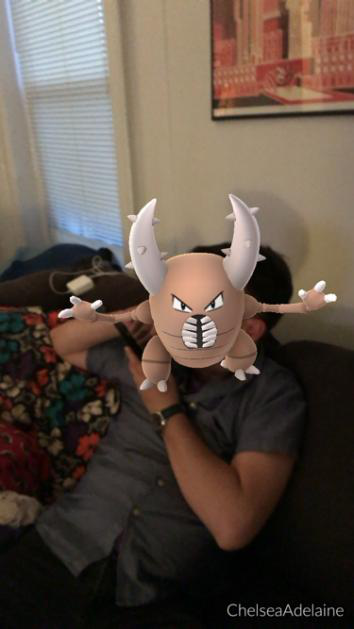As all mass cultural phenomena inevitably do, Pokémon Go—the hit augmented reality mobile game—almost immediately spawned a host of concerned criticism in the wake of its July release. One police department warned that criminals were using it to rob unsuspecting players, and a widely circulated blog post argued that it amplifies racial disparities. Others worried that it was inviting reckless driving or causing real injuries. Not all have been so critical of the game, though. To the contrary, some have suggested that it might actually be good for its players’ mental health. Framing the game in these terms may, however, be deceptive—perhaps even destructive.
Generally speaking, the idea seems to be that by encouraging us to leave our homes and head out into the world, Pokémon Go can help combat depression and overcome social anxiety. A roundup of such claims from Twitter Moments suggests the idea is relatively widespread, with one typical user testifying that the game “might just be the best thing for improving my mental health and positive body image.” BuzzFeed’s Alicia Melville-Smith interviewed a handful of players about their affirmative emotional responses to the game, each of them offering deeply personal anecdotes about their relationship to it.
While it’s entirely reasonable to say that the game is beneficial for some players, it’s important not to overgeneralize from their experiences. Moreover, given that the game has been available for less than a week, much of this enthusiasm—like the more hysterical responses it counters—may be a bit premature. In an otherwise enthusiastic article for Attn:, Laura Donovan acknowledges that research is inconclusive on whether merely going for a walk improves our emotional well-being—throwing a bit of cold water on the central premise of much of this testimony. The Harvard-based psychiatrist John Torous goes further, writing on Twitter that to claim the game is a mental health solution “belittles the struggles of many.” Nevertheless, others have taken the premise more or less on faith, inspiring at least one publication to write that “we can apparently expect a surprise health bonus” from the game.
Whatever the effects of low-level exercise, some of the good feelings players point to probably derive from other features of the game, features that have little to do with the demand to stroll. Most of all, there’s the simple pleasure of advancing your character and building your virtual menagerie. Even casual players will quickly gain in-game levels and improve their captured Pokémon in the early going, experiences that can feel like real accomplishments. Such features aren’t unique to Pokémon Go itself, though: You can find them in a host of existing mobile, console, and computer games, including in some more-or-less explicit Pokémon knock-offs. You might also point to Ingress, Pokémon Go’s more elaborate augmented reality predecessor. For many, attaching such features to a beloved franchise likely intensifies their delights, but the initial pleasures the game generates probably aren’t all that different from those you’d discover when first diving into World of Warcraft or another advancement-based role playing game.
Significantly, it’s entirely possible that these games offer real benefits, even when they don’t encourage players to exercise. Game designer Jane McGonigal has argued as much in Future Tense, writing that “purposeful game play builds self-confidence and real-world problem-solving skills,” which can, in turn, help stave off depression. While some have criticized McGonigal’s embrace of gamification—including in Slate—there’s clearly something to her premise that games can help us engage with our lives, and that they only really go wrong when we use them to flee from ordinary concerns. In this sense, some of the qualities players are attributing to Pokémon Go may simply be the products of video gaming more generally, not features that are unique to the new title.
There’s a slightly troubling quality, then, to the widespread celebration of Pokémon Go’s supposedly restorative powers. By holding the game up over (and implicitly against) others of its kind, these accounts may be inadvertently blowing a familiar dog whistle, one that plays into myths about gamers as mentally ill shut-ins. But that’s not, of course, to say that there’s anything wrong with getting a little exercise while you play (so long as you stretch first).
